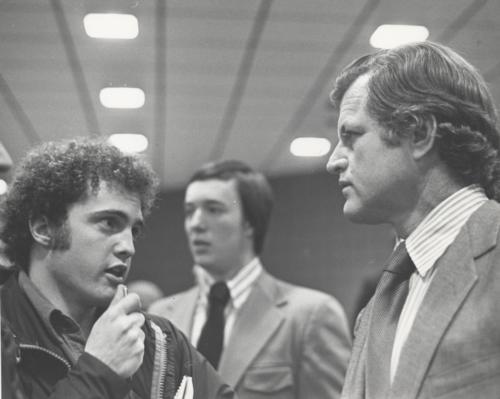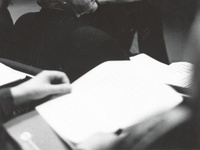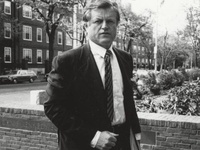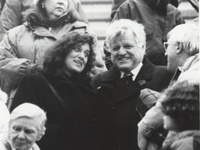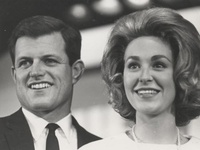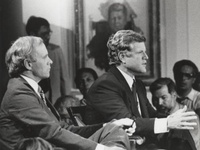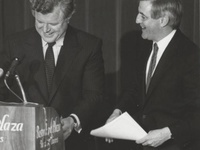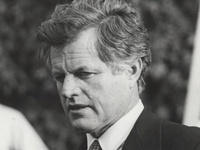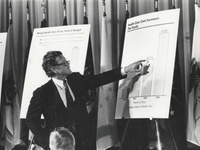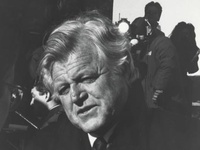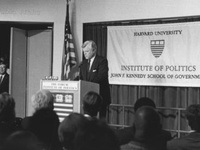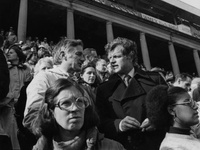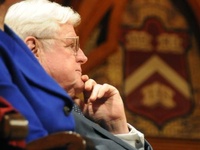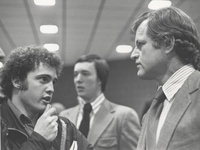Updated 8/27 at 1:30 a.m.
Massachusetts Senator Edward M. Kennedy '54-'56, the "Lion of the Senate" and the last remaining son of the prominent Democratic political family, passed away Tuesday night at his home in Hyannis Port, Mass. after a year-long battle with brain cancer. He was 77.
A Government concentrator and Winthrop House resident in his undergrad years, Kennedy was elected to serve in the U.S. Senate in 1962. He was senate majority whip from 1969 to 1971. Kennedy had been reelected seven times, making him the second-longest serving member of the Senate at the time of his death.
After a seizure in May 2008, he was diagnosed with a malignant glioma, a type of brain tumor that can carry a bleak prognosis. He underwent cancer treatment over the course of the year.
In the Senate, Kennedy developed a reputation as a leader on social policy issues, championing reforms in areas such as health care, education, and immigration, as well as leading multiple committees, including, most recently, the Senate Committee on Health, Education, Labor, and Pensions.
Multimedia
Though he was one of the dominant liberal figures in the Senate, Kennedy was also known for his efforts to reach across party lines to pass legislation—such as his alliance with former President George W. Bush on the No Child Left Behind legislation.
Throughout his years in office, Kennedy was particularly focused on reforming the nation's health care system, a passion showcased by his return to the U.S. Capitol last summer to vote on a Medicare bill while he was undergoing cancer treatment. Some supporters of health system reform efforts this summer had said they had hoped a viable reform would be ready in time for Kennedy to cast an "aye" vote.
Just last week, Kennedy had asked the state of Massachusetts to reconsider its policy on filling a vacant senate seat, as a way of raising discussion as to how his seat would be filled after his passing. Kennedy asked that the state legislature change the current law preventing Governor Deval L. Patrick '78 from appointing a temporary replacement, in hopes of aiding Democrats' current push to pass health care legislation.
“He’s one of a kind,” said Mass. Senator and former Presidential candidate John F. Kerry after a December ceremony held at Harvard to honor Kennedy. “It’s a privilege to serve with him.”
Edward Moore Kennedy was born February 22, 1932 in Boston, Massachusetts, the youngest of Joseph and Rose Kennedy's nine children. Kennedy bounced between schools as a child, ultimately graduating from Milton Academy in 1950. He followed in the footsteps of his father and older brothers by enrolling at Harvard that fall.
At the end of his freshman year, Kennedy was suspended after having another student take a Spanish exam in his place. He spent the next two years serving in the U.S. Army as a military policeman in Paris before re-enrolling at Harvard in the fall of 1953.
Upon returning to campus, he joined the all-male final club the Owl, an association he would disown in 2006 after drawing flak for condemning Supreme Court nominee Samuel A. Alito, Jr. for his one-time membership in the Concerned Alumni of Princeton, an organization that had taken a public stance against affirmative action and co-education at Princeton.
Kennedy was a noted member of Harvard's football team during his college career, scoring the only Harvard touchdown in the Harvard-Yale Game his senior year. He turned down an offer of interest from the Green Bay Packers, instead opting to attend law school at the University of Virginia.
While at the University of Virginia, Kennedy met his first wife, Joan Bennett, whom he married in 1958. The couple had three children—Kara, Edward Jr., and Patrick—before divorcing in 1982. After years of struggles with alcohol and a reputation for womanizing, Kennedy married lawyer Victoria Reggie in 1992. She remained at the senator's side during his future political endeavors and recent illness.
Kennedy's most notable scandal came in 1969 when he drove off a bridge on Chappaquiddick Island in Martha's Vineyard, an incident which resulted in the drowning death of his passenger, Mary Jo Kopechne. After swimming to safety, Kennedy did not call police until after Kopechne's body was found the following day. The senator pled guilty to leaving the scene of an accident, but remained in office and was reelected in 1970.
Read more in News
Marathon Racers Run for Charity








